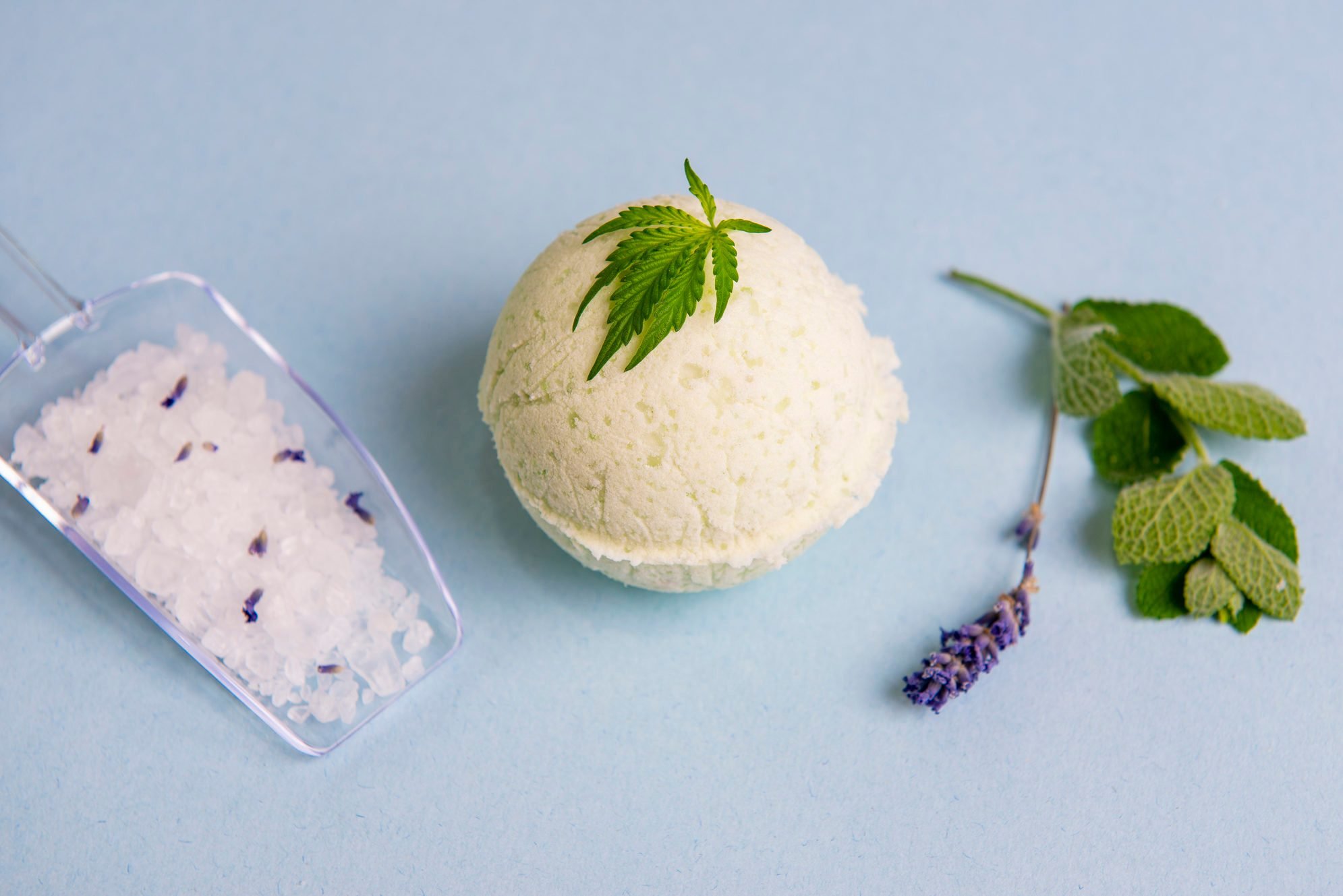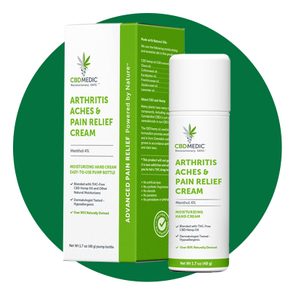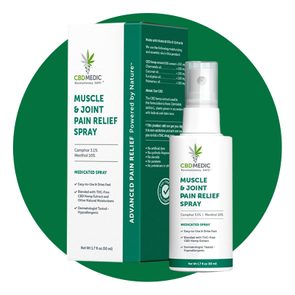Can CBD Bath Bombs Really Help You Relax?
Updated: Mar. 04, 2021
CBD bath bombs tend to contain CBD oil, essential oils, and fragrances to promote relaxation. But do they actually work? Experts weigh in on that, plus how safe they are and how to shop for them.
Our editors and experts handpick every product we feature. We may earn a commission from your purchases.
Understanding CBD bath bombs
Bath bombs may seem a strange place to find cannabidiol (CBD)—after all, the fizzy balls are meant to provide essential oils, fragrance, and fun color to your bath. But they’re another way to absorb CBD through your skin, much like creams, balms, or lotions.
“You get in the bath and you hit those cannabinoid receptors in the skin,” says Bonni Goldstein, MD, medical director and owner of Cannacenters, and author of Cannabis is Medicine.
For many people, activating those receptors (which are part of the body’s extensive endocannabinoid system) seems to produce various health benefits. Here’s everything you need to know about CBD bath bombs, including how they work, how safe they are, and how to shop for one. (Also check out the best bath soaks for better relaxation.)
What is CBD?
CBD is one of two main active ingredients found in the cannabis plant. Unlike its more famous counterpart, delta-9-tetrahydrocannabinol (THC), CBD does not get you high.
Most of the CBD in the United States actually comes from hemp, which is related to the cannabis plant. Since the Farm Bill passed in 2018, farmers have been able to grow hemp legally as long as it contains no more than 0.3 percent THC. (Here’s more on the differences between CBD vs THC.)
CBD and the endocannabinoid system
The endocannabinoid system (ECS) is a complex web of messaging between different parts of the body, including your skin. Researchers suspect that deficiencies in the ECS may contribute to different health conditions, from fibromyalgia to migraines and autism. If this is true, then it makes sense that CBD could improve health by addressing deficiencies.
Right now, there’s not a lot of strong human research backing these claims, says Martin A. Lee, cofounder and director of Project CBD, a California nonprofit that promotes CBD research, and author of Smoke Signals: A Social History of Marijuana–Medical, Recreational, and Scientific.
The one exception is pediatric epilepsy, where there’s solid science showing CBD’s benefit for a rare and severe form of epilepsy. The evidence was strong enough to prompt the Food and Drug Administration (FDA) to approve Epidiolex, the first and only drug containing CBD, in 2018.
Studies in animals suggest that CBD may help with arthritis, cancer, and prediabetes, among other diseases. Meanwhile, anecdotal reports, including a 2018 study published in Cannabis and Cannabinoid Research, indicate CBD products may alleviate pain, anxiety, depression, and other ailments.
Animal studies are, however, just the starting point—early research that clues scientists into whether or not a theory is worth greater study. Until there good, larger-scale studies in humans, we can’t say with certainty that CBD impacts health.
(For pain relief, check out the best CBD oil for pain.)

CBD bath bombs for relaxation
Along with cosmetics, lip balm, massage oils, and more traditional creams and lotions, bath bombs fall into the category of “topical” products, or those you put on your skin.
Unlike other forms of CBD (like CBD oils, CBD tinctures, vape cartridges, CBD capsules, and CBD edibles), bath bombs don’t affect all parts of your body. “I would not expect that it would penetrate into your bloodstream,” says Dr. Goldstein.
Plus, CBD may only account for part of the bath bomb’s ability to relax. “There’s going to be other stuff in there [like Epsom] that will give a relaxing effect,” says Lee.
After all, soaking in a bathtub to unwind has a long history (think hot springs). “It makes perfect sense,” says Lee. “It’s a time-tested, age-old phenomenon. This would be a way of augmenting it.”
CBD and your skin
Although strong studies are lacking, it’s possible CBD could help the skin. A 2019 study in Experimental Dermatology suggests the ECS can affect skin repair, cell proliferation, and inflammation. Bear in mind that the study was done in mice and did not look specifically at any CBD products. We’re still a long way from definitively saying CBD products can help your skin.
Types of CBD bath bombs
Like any other CBD product, bath bombs differ depending on the ingredients. There are three basic types:
- Full-spectrum CBD: This type of product contains all of the components of the hemp plant (Cannabis sativa), including CBD and also small traces of THC and terpenes, which are plant compounds.
- Broad-spectrum CBD: This type of CBD is similar to a full-spectrum but doesn’t contain THC.
- CBD isolates: This purest form of CBD contains only CBD.
Lee says that broad- and full-spectrum products may be more powerful, as the different ingredients work together synergistically.
CBD dosage for bath bombs
Studies, like one from 2019 published in the British Journal of Clinical Pharmacology, have investigated CBD to treat sleep problems, anxiety, and pain in a wide range of CBD doses, from less than 1 mg per day to 1,000 mg per day or more.
Because of the lack of research, it’s unclear what dosage you would need in a bath bomb to feel any effects. This is generally true no matter what the product. Coming up with the right dose is mostly trial and error, says Dr. Goldstein.
The general recommendation is to start low and go slow. Project CBD recommends starting with 2.5 to 5 mg, but this will vary depending on what you use it for.
(Looking for a better night’s sleep? Check out this buyer’s guide on CBD products for sleep.)
Are CBD bath bombs safe?
CBD in general is considered pretty safe, as long as you get a good product. If you buy a poor-quality product, you run the risk of contaminants, pesticides and heavy metals among them. You may also be getting a different dose of CBD than what’s indicated on the label.
The FDA does not regulate CBD products, and a 2017 JAMA report found that only 31 percent of 84 commercially available CBD products actually contained what the product stated.
CBD can interact with other drugs, so before trying a product, visit the National Library of Medicine for a list of all potential drug interactions. And be sure to check with your health care provider before using CBD. Certain people have reported side effects like fatigue, not wanting to eat, diarrhea, and dry mouth.
Is it legal to buy CBD products?
That depends largely on where you live. Thirty-six states and four territories have approved medical marijuana, and more are considering it. In those regions, products containing CBD and/or THC are legal at the state level, and you can get them from licensed dispensaries.
The federal government sides with the 14 states that have not legalized marijuana. The Drug Enforcement Administration still includes marijuana and all its derivatives (including CBD) on its list of Schedule I controlled substances. So while your state may give you the OK to buy, doing so is illegal at the federal level.
Here’s the caveat: If your CBD comes from hemp that contains no more than 0.3 percent THC, you’re in the clear. Since the 2018 Farm Bill passed, hemp products that don’t exceed the THC limit are no longer considered controlled substances by the federal government.
Before you buy CBD products, check to see if it’s legal in your state. If it is, buy hemp-based CBD from a licensed dispensary where you can be better assured of the quality.
How to buy CBD bath bombs
Given that the FDA does not regulate CBD products, it’s important that you do your own research before buying, especially if you’re not working with a licensed dispensary or medical professional. Here are some guidelines for buying CBD:
- Only buy from companies you can contact either by phone or through their website (many websites have chat features).
- Regardless of whether you’re buying CBD oil or bath bombs, ask for a Certificate of Analysis, which means that an independent, third-party lab has tested the batch and verified that the ingredients are what they say they are.
- Buy CBD from U.S.-grown hemp, which is less likely to be contaminated. Also, check that the company follows FDA good manufacturing practices.
Next, here are the best CBD oils for anxiety and stress.


















